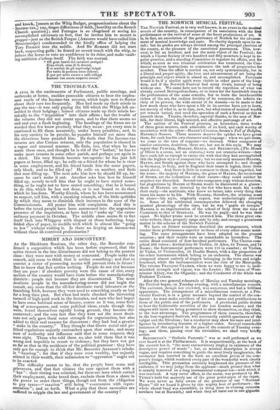MISERY AND DISCONTENT.
AT the Blackburn Sessions, the other day, the Recorder con- firmed a supposition which has been before expressed, that the active rioters in the late disturbances did not belong to the poorest class : they were men with money at command. People make the remark, and seem to think that it settles something ; and that to convict a rioter of possessing means will prevent riots in future ! But to know that fact settles nothing. People do not riot because they are poor : if absolute poverty were the cause of riot, every section of the country would have risen before the manufacturing- districts : people riot because they are discontented. The most destitute people in the manufacturing-towns did not begin the tumult, any more than the all-but destitute rural labourers or the famishing Irish, because they were used to something nearly as bad for a long time past. But when bad trade checked the increasing turmoil of high-paid work in the factories, and men who had begun to have some habitual sense of luxury, coarse as it was, some feel- ing of consequence, and some political ideas, crude though they were, found themselves rapidly losing ground, they became dis- contented; and the very fact that they were not the most desti- tute not only gave them some strength for organization, but also added to their real reasons for discontent : they had had a greater ". !take in the country." They thought that divers social and po- litical regulations unjustly encroached upon that stake, and many men of authority and influence said that in some respects they were right. Those who told them so, also told them that it was wrong and impolitic to resort to violence; but they have not got so far as that in the accidence of the political grammar: they have only got far enough to think that Mr. Recorder ADDISON'S rebuke is" humbug " ; for that if they were even wealthy, but unjustly stinted in their wealth, their submission to " oppression " ought not to be exacted.
The difficulty seems to be, that the people have some real grievances, and that fact 'vitiates the case against them with a " but ": their rioting was criminal, but there are laws which curtail their employment, make bread dear, exclude them from a share in the power to order these things, though not from the cbligation to pay taxes—" taxation" still being " coextensive with repre- sentation "; and so forth. What a pity that these anomalies are suffered to cripple the law and government of the country


























 Previous page
Previous page